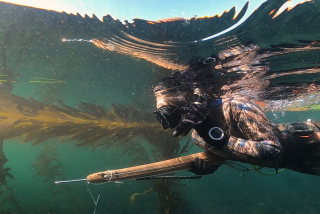Class is in session; pass the rod ‘n’ reel
- Share via
VALERIE CHERON IS not having fun.
It’s dawn at the dock in early November, and the shy 12-year-old who has never been fishing before -- “I don’t like to wake up early and I don’t like to eat fish” -- feels anxious. Would she remember everything she learned in class? Would she look goofy in front of her classmates, most of them boys and several of them experienced anglers?
She worries that the few girls on the field trip will outperform her. She frets that she might not detect when the fish bites the bait and will forget how to reel it in -- despite all the practice with rods and reels on the playground at Ensign Middle School in Newport Beach.
Gym class instructor Joe Fuschetti, a 40-year-old with three daughters, understands her anxiety. He’s been a coach and teacher for 16 years. The Orange County native created the fishing and boating safety program at Ensign to reach kids like Valerie.
“The kids have really responded to this, and it’s so fortunate that we’ve had such overwhelming response and support from the parents,” Fuschetti says.
Valerie eyes the trough at the stern that deckhand Greg Oldfield fills with live sardines. Catching a fish will first require snatching one of the tiny fish that dart back and forth.
Teacher Scott Smith hands Valerie a new rod and reel, one of dozens Fuschetti purchased with the $5,000 grant he received from the Future Fishing Foundation.
The grant allowed him to start the state’s first fishing program this fall for 275 seventh- and eighth-graders. It involves three weeks of classroom instruction that combines biology and ecology with the art of fishing. He’s one of 43 teachers in 22 states who obtained the grants.
Sunglasses atop her head with the sleeves of her dark blue jacket pushed up to her elbows, Valerie seems dressed more for the mall than an ocean outing.
She awkwardly grasps the rod and reel as the boat comes to a stop and sets anchor at the southwestern tip of Catalina Island where the skipper’s sonar detects a school of bonito.
Propping the pole against the rail, Valerie joins a rush of 40 students, a dozen parents and a small cadre of teachers as each person grabs a sardine.
“I hate to hurt it,” Valerie says with a sympathetic frown, setting the hook in the sardine’s gaping mouth.
In a practiced motion, she sets the bail for casting, looks over her right shoulder for a clear cast, then smoothly launches the sardine 20 yards off the starboard side. The bait swims back and forth as the line slowly disappears below the surface. As the waiting begins, Valerie tries to will a fish onto her hook.
All eyes are focused on the water. Just as they have been taught, the students reel in their lines to check their bait. Sardine still swimming? Good. Let out line. Valerie wants fresh bait. She knows the rule: fresh bait every five minutes. Another sardine. Another smooth cast.
The boat comes alive with the kids shouting, parents running to help them as the bonito hit. Valerie is among the first -- and the first girl -- to land a fish. She feels the weight of the fish pulling on her pole as she reels it in. It flops on the deck, and deckhands scramble to stuff Valerie’s and other anglers’ first catches into burlap bags.
Valerie wades through the crowd to retrieve another sardine, then hurries back to her spot at the rail. No sooner does she cast than her second bonito hits the bait. Valerie gets a third.
“We’re going to fill your bag today!” Smith shouts in encouragement. Her face has lost the intensity and softens slightly. She’s beaming but still nervous. Her eyes are alive with the excitement unfolding on the deck around her.
But this is no time to be distracted. Replace the bait. Cast. Wait for that “tap, tap, tap” on her hook as the bonito noses the bait. She feels it and lands five fish before the trip ends. Several students return without even catching one.
“I did good,” she says with pride. “I got three in five minutes.”
For being the first girl to land a fish, Fuschetti gives Valerie the $300 pole and reel that served her so well. She is thrilled, but quick not to do anything so uncool as high-five the teacher.
“Yes, I want to go fishing again,” she says with a laugh. And a chunk of bonito the galley chef cooked up has also changed her mind about eating fish.
“It’s good. I’m going to eat this tonight,” she said, holding her bag of freshly cleaned fillets.


